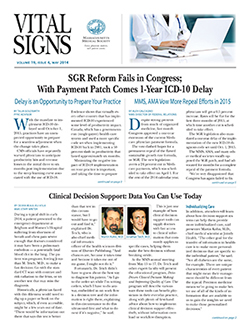Outreach Activities: June 1, 2013, to May 31, 2014
PHS presentations provide information on physician health issues and the role of PHS, and include helpful information about how to identify those at risk, factors that can impact patient care, ways to access help, and steps to improve the physician-patient relationship. More than 2,100 physicians and medical students across Massachusetts were in attendance at PHS presentations this year.
If we haven’t been to your hospital or health care organization, please contact us at (781) 434-7404 or complete the speaking engagement request form.
PHS presented at or were in attendance at the following organizations/events:
18th Annual Participants’ Dinner
PHS organizes a special dinner event each fall for participants. The dinner provides us with the opportunity to update participants on program activities, introduce the associate directors and staff, and share experiences of strength and hope. Physicians who have successfully completed the PHS program in the past or who are presently involved in the program are invited to attend.
- Baystate Medical Staff Health Committee
- Berkshire Medical Center
- Beth Israel Deaconess Hospital — Plymouth
- Blue Cross Blue Shield of Massachusetts — Leadership Team
- Boston Medical Center — Credentialing Committee
- Boston Medical Center — Dept of Psychiatry Grand Rounds
- Boston Medical Center — Medical/Dental Staff
- Bournewood Hospital
- Cape Cod Hospital — General Medical Staff
- Cape Cod Hospital — Physician Leadership
- Cape Cod Symposium
- Carney Hospital
- Dental Health and Wellness Appreciation Dinner
- Falmouth Hospital
- Federation of State Physician Health Programs Annual Conference
- Governor’s Opiate Task Force
- Hartford Hospital
- Harvard Medical School — Dean/Leadership
- Harvard Pilgrim Health Care — Leadership
- Harvard Surgical Chiefs Safety Collaborative
- Harvard Vanguard Medical Associates — IMCO
- HealthAlliance Hospital — Leominster
- Harvard Medical School Liability and Prevention Program
- Holy Family Hospital
- Lahey Hospital and Medical Center
- Lawrence General Hospital — Grand Rounds
- Lemuel Shattuck Hospital
- Massachusetts College of Emergency Physicians
- Massachusetts Hospital Association Physician Leadership Council
- Massachusetts Psychiatric Society Anniversary Celebration
- Massachusetts Society for Healthcare Risk Management
- Mclean Hospital — Alcohol And Drug Abuse Treatment Program Fellows
- Metrowest Medical Center — Leonard Morse Hospital Campus
- Metrowest Medical Center — Physician Health Committee
- Metrowest Resident Lecture Series — New Residents
- Milton Hospital
- Massachusetts Medical Society Alliance — Quarterly Meeting
- Massachusetts Medical Society Benevolent Society
- Massachusetts Medical Society Young Physicians — Professional Development Program
- Morton Hospital
- Newton-Wellesley Hospital
- North Shore Medical Center — Salem Hospital
- Senior Physician Leaders of Steward
- South Shore Hospital
- St. Vincent Hospital
- Steward Norwood Hospital
- Tufts Health Plan — Leadership
- Tufts Health Plan — Quality of Care Committee
- Tufts Medical Center — Intern and House Staff Orientation
- Tufts University School of Medicine — Dean/Leadership
- UMass Medical School — Addiction Psychiatry Seminar
- UMass Medical School — Dean/Leadership
- Union Hospital — North Shore Medical Center
- Winchester Hospital
Articles, Presentations, and Consulting
One of the most important activities of Physician Health Services is educating physicians, residents, medical students, health care administrators, hospitals, HMOs, and the public regarding the prevention, early identification, and treatment of addiction and other illnesses that affect physicians. Areas emphasized include stress prevention, prescribing practices, communication skills, and time management. PHS also provides education regarding the types of services we offer, which go well beyond support for substance use disorders. PHS services include assistance with physical, emotional, and behavioral problems as well.
Facing the Loss of a Physician
PHS experiences great sadness when a physician is lost as a result of an illness or unexpected death. During times such as these, PHS makes every effort to provide support to the physician’s family and colleagues. We recognize the tremendous grief a family faces and share each loss with the medical community. It is important for PHS to ensure that outreach is supportive, comprehensive, and helpful while remaining respectful of physician confidentiality.
Articles regarding issues of physician well-being are a regular feature in Vital Signs, the monthly member publication of the Massachusetts Medical Society. These articles also appear on the Massachusetts Medical Society website at www.massmed.org/vitalsigns.
PHS regularly exhibits materials at conferences and professional meetings, where we are able to personally meet with physicians and present the various ways in which the program can be of service to them. (See the speaking engagement request form here.)
Vital Signs
Physician Health Services features a monthly column in the Medical Society’s member newsletter, Vital Signs. The column is dedicated to timely topics of interest related to physician health and wellness. You can contact PHS for a copy of any of the articles, or visit www.massmed.org/vitalsigns. 
Articles Published June 2013 to May 2014
Managing Workplace Conflict: “Improving Personal Effectiveness"
An educational program jointly sponsored by the Massachusetts Medical Society and Physician Health Services, Inc.
Recognizing that disruptive behaviors can impact and interfere with a physician’s ability to practice medicine effectively, PHS designed the Managing Workplace Conflict program to help attendees assess difficult relationships and stressful situations and consider ways to respond differently to minimize conflict.
Twice each year, PHS offers this interactive program that combines didactic presentations, roleplaying exercises, and focused feedback for physicians with the motivation to make changes in the way they interact with their colleagues and patients. Pre-, post-, and follow-up evaluations demonstrate improvement in the skills of the physicians who attend (an average increase of 2.9 to 4.56 on a scale of 1 to 6). Both hospitals and physicians welcome this tangible resource to assist physicians with interpersonal communication, conflict resolution, and stress management. PHS is proud to have developed such a successful program.
The course is available to all physicians and residents interested in learning methods to improve relationships at work and interpersonal skills to combat difficulties in the workplace.
Course Instructors
 Ronald Schouten, MD, JD, is director of the law and psychiatry service and a psychiatrist at Massachusetts General Hospital, a clinical affiliate in psychiatry at the McLean Hospital, and an associate professor of psychiatry at Harvard Medical School. He is the founder and president of KeyPeople Resources, Inc., an organizational and behavioral health consulting firm.
Ronald Schouten, MD, JD, is director of the law and psychiatry service and a psychiatrist at Massachusetts General Hospital, a clinical affiliate in psychiatry at the McLean Hospital, and an associate professor of psychiatry at Harvard Medical School. He is the founder and president of KeyPeople Resources, Inc., an organizational and behavioral health consulting firm.
 Charles W. Swearingen, MD, is a psychiatrist and management consultant and the founder and principal of Pierian Consulting.
Charles W. Swearingen, MD, is a psychiatrist and management consultant and the founder and principal of Pierian Consulting.
 Steve Adelman, MD, is director of Physician Health Services. Dr. Adelman is a board-certified psychiatrist with extensive clinical and administrative experience in addiction psychiatry and addiction medicine
Steve Adelman, MD, is director of Physician Health Services. Dr. Adelman is a board-certified psychiatrist with extensive clinical and administrative experience in addiction psychiatry and addiction medicine
 Diana Barnes Blood, MSW, LICSW, has private practices in Lincoln and Brookline working with individuals and couples in psychotherapy. She currently facilitates a support group three times a month designed to provide physicians with strategies to enhance coping skills.
Diana Barnes Blood, MSW, LICSW, has private practices in Lincoln and Brookline working with individuals and couples in psychotherapy. She currently facilitates a support group three times a month designed to provide physicians with strategies to enhance coping skills.
At the end of this two-day program, attendees share strategies they learned that they feel will be most valuable for practical application in the practice setting. Here are some strategies physicians shared:
“I learned the importance of talking to others for support prior to responding to a stressful situation — such as a colleague, spouse, or coworker. The peer support offered during this program was invaluable.”
“I will monitor myself for triggers and take a step back before responding abruptly.”
“I learned the importance of healthy habits such as taking a break, taking a lunch, exercise, and meditation.”
“I will be more aware of how I am feeling before I start the day.”
“Be mindful to show respect to others, especially before and during conflicts.”
“Remember that we are all in this together; there are common experiences and stressors.”
“Look for ways to pass along positive comments that you hear about other coworkers or other physicians… including results from satisfaction surveys.”
“Consider a reasonable solution; compromise based on cost/benefit.”
“Think of the impact and intent of an intense conversation and choose words carefully.”
“Put myself in the other person’s shoes.”
“Take a deep breath before responding to a stressful situation.”
Following are some course comments from attendees:
“This was an extremely balanced and excellent conference — it reminded me of ways to communicate effectively and the pitfalls docs and medical staff can fall into. Thank you for an extremely helpful conference.”
“The content increased my self-awareness in stressful situations.”
“I feel I can achieve more without conflict.”
“This course should be mandatory for all physicians.”
“This is truly an excellent workshop. I felt a strong sense of community with the other physicians as we shared our travails. All of the instructors/facilitators contributed to allowing the group to work as it did.”
“The first time I took this course, it was just the opening to a whole new world for me. Learning to begin to see that intent didn’t equal impact and how to change my impact. Two years later, the course impacted me on a deeper level and I was able to listen more closely and learn about different people’s personalities and perceptions on a deeper level. And hearing the lectures the second time around had an even greater effect. I had many epiphanies (‘ah ha moments’) during these past two days, and it is still valid and appropriate to my practice... for conflict will always exist... it’s how we interact and address the conflict that really matters! Thanks!”
PHS Is Available to Your Hospital or Medical Practice
PHS is available to provide tailored educational programs appropriate for the following:
- Hospital grand rounds
- Group medical practices
- Health care organizations
- Specialty society meetings
Our goal is to reach every Massachusetts health care organization and medical school on an annual basis. Presentations are eligible for CME credit and meet the criteria for risk management study. Please contact us to coordinate an educational program at your organization.
The Joint Commission, an independent, not-for-profit organization that accredits and certifies more than 17,000 health care organizations and programs in the United States, adopted a physician health requirement (Physician Health MS.2.6) effective January 1, 2001. In 2004, the Joint Commission further expanded the requirement to all health care professionals (originally LIP Health MS.06, now MS.11.01.01). This provision requires the medical staffs of all hospital organizations to implement a process to identify and manage the health of licensed, independent practitioners separate from medical staff disciplinary functions. One element of the Joint Commission requirement is annual education on matters of physician health. PHS consults with medical staff, medical executive committees, and hospitals throughout the state to help them implement and maintain this requirement by providing presentations.
In addition, effective January 1, 2009, the Joint Commission instituted a leadership standard for accreditation programs (LD.03.01.01) that focuses on maintaining a culture of safety and quality by addressing inappropriate behaviors in two of its elements of performance. First, the hospital/organization must have a code of conduct that defines acceptable and disruptive and inappropriate behaviors (EP 4). Second, leaders must create and implement a process for managing disruptive and inappropriate behaviors (EP 5). Additionally, standards in the medical staff chapter have been organized to follow six core competencies to be addressed in the credentialing process, including interpersonal skills and professionalism (see the introduction to MS.11.01.01). The Joint Commission issued an advisory on November 9, 2011, regarding the disruptive behavior standard. It clarified that the phrase “disruptive behavior” is intended to include “behavior or behaviors that undermine a culture of safety.” This clarification came about for a few reasons, such as:
- The term “disruptive” was not viewed favorably by some in health care.
- “Disruptive” alone can be ambiguous to some audiences.
- Strong advocates for patient care improvements can be viewed as “disruptive.”
- The term can be used in settings temporarily unsettled by patient behavior.
The Joint Commission also has a leadership standard LD.02.04.01 to address how a hospital should manage conflict between leadership groups to protect the quality and safety of care. The standard states that a hospital should engage an individual with conflict management skills to implement and carry out the conflict management process. The process should include (1) meeting with the involved parties as early as possible to identify the conflict, (2) gathering information regarding the conflict, (3) working with the parties to manage and, when possible, resolve the conflict, and (4) protecting the safety and quality of care. PHS is available for consultation with medical staff and hospital leadership on policies in these areas, for individual circumstances, or to provide educational programs.
Dr. Adelman has contributed to the Massachusetts Medical Society’s Each Patient Counts Weblog. Please visit this blog on hot topics related to physician health and wellness. Opinions expressed here are his own, and do not necessarily reflect those of the Massachusetts Medical Society or Physician Health Services.
Presentations provide up-to-date information on physician health issues and the role of PHS and include a discussion on how to identify those at risk, factors that can impair patient care, ways to access help, and steps to improve the physician-patient relationship. An educational DVD about PHS, brochures, and other supportive materials are also available.
The speaking engagement request form can be found online here.
Board of Registration in Medicine
PHS is independent of the Board of Registration in Medicine (BRM), the state agency responsible for the licensure and discipline of physicians in Massachusetts. However, PHS serves as an important resource for physicians dealing with licensing issues as a result of health impairment or other health concerns. PHS helps facilitate physicians’ interactions with the BRM by educating physicians about licensing procedures, providing documentation of compliance for physicians being monitored, and offering resources for outside services and legal representation to assist with board actions.
PHS regularly interacts with the staff as the BRM responsible for health-related matters. PHS meets with the BRM staff each month to provide continuity for physicians under monitoring agreements with both PHS and the BRM and enhance communication regarding areas of mutual concern, including physician support services, remediation, and protection of the public. PHS also meets periodically with BRM members and staff to address policy and programmatic issues likely to impact physicians facing health problems.
Exception to Mandated Reporting
Important Exception to Mandatory Reporting to the Board of Registration in Medicine
Diversion to PHS is possible when all of the following criteria apply:
- The circumstances involve a drug or alcohol problem.
- There is no allegation of patient harm or other violation of law.
- The physician agrees to participate in PHS.
- The reporter receives confirmation from PHS within 30 days that the physician is compliant with the program .
Massachusetts law requires certain health care professionals to report to the BRM when they become aware that a physician has violated BRM rules or regulations. This includes reporting when there is a reasonable basis to believe that a physician is a habitual user of drugs or alcohol, is practicing medicine while impaired by drugs or alcohol, or is impaired in the ability to practice as a result of a mental health concern.
Under specific circumstances, instead of making this report to the BRM, a referral can be made to PHS, allowing the physician to obtain remedial services. This is possible only in the case of drug/alcohol matters, when there is no allegation of patient harm, no other violation of the law, the physician agrees to participate in PHS, and the reporter receives timely confirmation from PHS that the physician is in compliance with our program (within 30 days). By serving as an approved program, PHS is able to provide confidential support services and assistance to a wider range of physicians who face drug and alcohol problems. Currently this exception to mandated reporting is approved only for drug and alcohol issues, however, PHS is hopeful that in the future the exception will be extended to other health conditions, including mental health issues.
At times, the BRM itself enters into disciplinary or nondisciplinary agreements with physicians who face health challenges such as substance use disorders, mental illness, behavioral health concerns, or physical health concerns that require support and monitoring. In these circumstances, the BRM often asks PHS to provide monitoring. PHS then provides the BRM with confirmation that the physician is compliant with a treatment plan while simultaneously providing the physician with professional and personal support.
